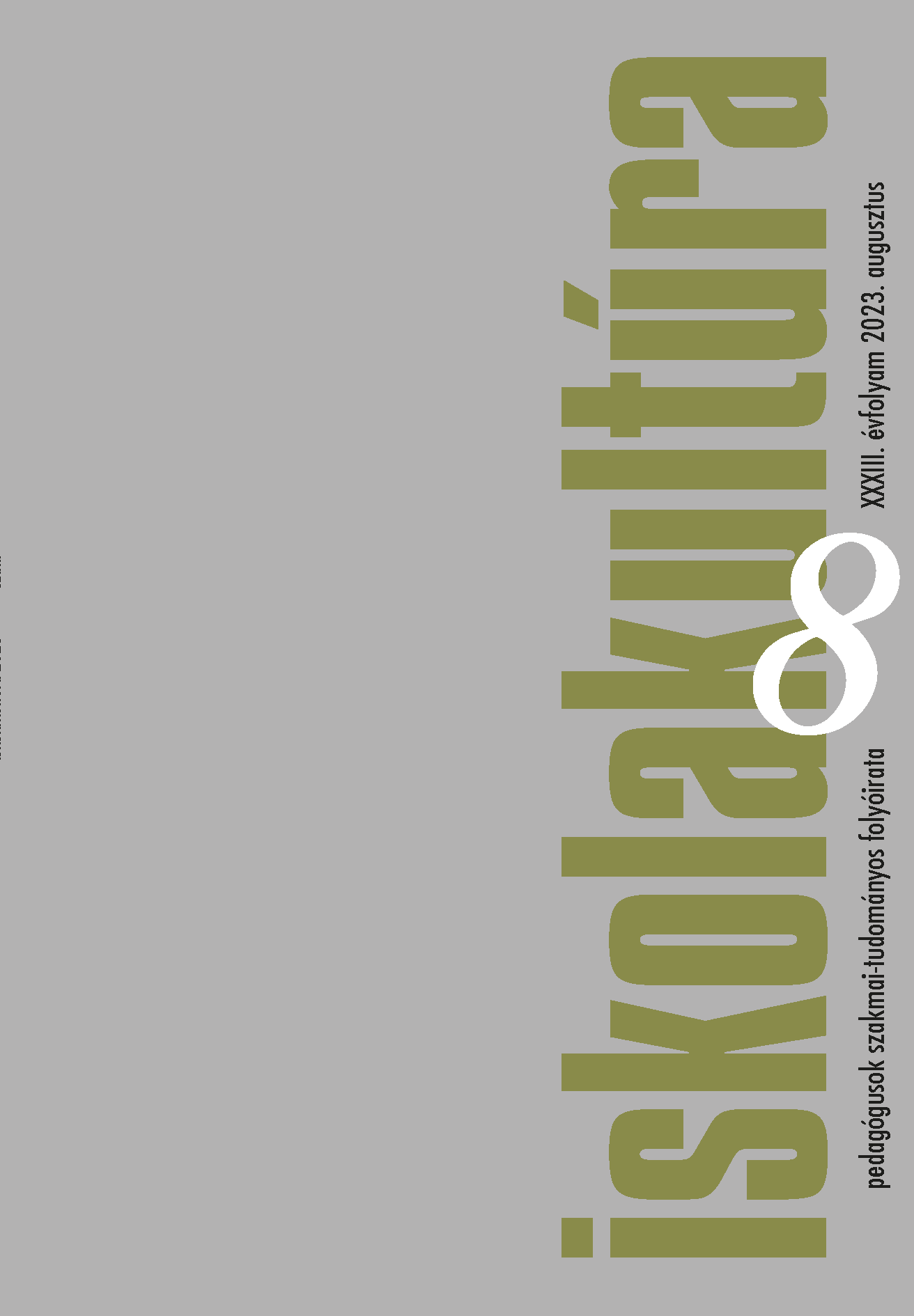Success of math learning in the light of the sensorimotor and cognitive profile of school-age children
Main Article Content
Abstract
In our research, we follow the progress of primary school pupils in different areas. We first assessed the sensorimotor and cognitive abilities of 415 children starting school and compared these profiles with their teachers’ assessment of their level of academic success in mathematics. The Sensory-Motor and Cognitive Profile Test is a tool for teachers to obtain information on children’s developmental profiles in order to use the results to plan personalised approaches to mathematics learning. Test results show that 20% of children do not have the mature working memory, sensorimotor and cognitive functions that are essential for learning mathematics. Only 53% of first graders were able to master the material well. The groups of first graders who failed or performed very poorly in mathematics in the first months of school differed from the better performing groups on all observed variables. The results confirmed that the most critical area, along with abstract thinking and quantitative reasoning, is working memory. A number of sensorimotor areas, such as body schema and spatial orientation, seriality and even balance, are among the areas that need to be improved in order to give children a chance of making acceptable progress in mathematics.
Downloads
Article Details
Funding data
-
Magyar Tudományos Akadémia
Grant numbers SZKF-1/2021
References
Agostini, F., Zoccolotti, P., & Casagrande, M. (2022). Domain-General Cognitive Skills in Children with Mathematical Difficulties and Dyscalculia: A Systematic Review of the Literature. Brain sciences, 12(2), 239.
Asakawa, A., & Sugimura, S. (2022). Mediating process between fine motor skills, finger gnosis, and calculation abilities in preschool children. Acta psychologica, 231, 103771. https://doi.org/10.1016/j.actpsy.2022.103771
Casey B, Lombardi C, Pollock A, Fineman B, & Pezaris E. (2017). Girls’ spatial skills and arithmetic strategies in first grade as predictors of fifth-grade analytical math reasoning. Journal of Cognition and Development 18:530–555
Carlson, J. S., & Jensen, C. M. (1980). The factorial structure of the Raven Coloured Progressive Matrices test: A reanalysis. Educational and Psychological Measurement, 40(4), 1111-1116.
Cueli, M., Areces, D., García, T., Alves, R. A., & González-Castro, P. (2020). Attention, inhibitory control and early mathematical skills in preschool students. Psicothema, 32(2), 237–244. https://doi.org/10.7334/psicothema2019.225
Dékány Judit (2009). Tanulási sikeresség és matematikai kompetencia. Gyógypedagógiai Szemle, 5, 356–361.
Fernández-Méndez, L. M., Contreras, M. J., Mammarella, I. C., Feraco, T., & Meneghetti, C. (2020). Mathematical achievement: the role of spatial and motor skills in 6-8 year-old children. PeerJ, 8, e10095. https://doi.org/10.7717/peerj.10095
Flores, P., Coelho, E., Mourão-Carvalhal, M. I., & Forte, P. (2023). Association between motor and math skills in preschool children with typical development: Systematic review. Frontiers in psychology, 14, 1105391. https://doi.org/10.3389/fpsyg.2023.1105391
Gilmore, C., & Cragg, L. (2018). The role of executive function skills in the development of children’s mathematical competencies. In A. Henik & W. Fias (Eds.), Heterogeneity of function in numerical cognition (pp. 263–286). Elsevier Academic Press.
Gyarmathy Éva & Smythe, Ian (2000). Többnyelvűség és az olvasási zavarok. Erdélyi Pszichológiai Szemle. December. 63-76.
Gyarmathy Éva, Gyarmathy Zsófia & Szabó Zénó (2021). A Sakkpalota képességfejlesztő program hatásvizsgálata. Új Pedagógiai Szemle, 71. évfolyam 03-04. szám.
Kertzman, S, Gyamathy E, Vainder, M, Vojtová, V, Mikulášek. L, Sirota, A, Motschnig, R, Hagelkruys, D, Lerer, B. (2017) Web-based Real-time Neuropsychological Assessment in Dyslexia. BMC Psychiatry, BPSY-D-16. ISSN 1471-244X.
Kyttälä, M., & Lehto, J. E. (2008). Some factors underlying mathematical performance: The role of visuospatial working memory and non-verbal intelligence. European Journal of Psychology of Education, 23(1), 77–94.
Krajcsi Attila (2005) Numerikus feladatok mögött meghúzódó elemi funkciók mérése a
szelektív terhelés módszerével. Magyar Pszichológiai Szemle, 60, 4, 457–478.
Linder, S.M., & Simpson, A. (2018). Towards an understanding of early childhood mathematics education: A systematic review of the literature focusing on practicing and prospective teachers. Contemporary Issues in Early Childhood, 19, 274 - 296.
Parviainen, P. (2019). The development of early mathematical skills – A theoretical framework for a holistic model. Journal of Early Childhood Education Research, 8(1), 162–191.
Penner-Wilger, M., & Anderson, M. L. (2013). The relation between finger gnosis and mathematical ability: why redeployment of neural circuits best explains the finding. Frontiers in psychology, 4, 877. https://doi.org/10.3389/fpsyg.2013.00877
Pickavance, J. P., Giles, O. T., Morehead, J. R., Mushtaq, F., Wilkie, R. M., & Mon-Williams, M. (2022). Sensorimotor ability and inhibitory control independently predict attainment in mathematics in children and adolescents. Journal of Neurophysiology, 127(4), 1026–1039. https://doi.org/10.1152/jn.00365.2021
Pind, J., Gunnarsdóttir, E. K., & Jóhannesson, H. S. (2003). Raven's Standard Progressive Matrices: new school age norms and a study of the test's validity. Personality and Individual Differences, 34(3), 375-386.
Rittle-Johnson, B., Fyfe, E. R., Hofer, K. G., & Farran, D. C. (2017). Early Math Trajectories: Low-Income Children's Mathematics Knowledge From Ages 4 to 11. Child development, 88(5), 1727–1742. https://doi.org/10.1111/cdev.12662
Rohde, T. E., & Thompson, L. A. (2007). Predicting academic achievement with cognitive ability. Intelligence, 35(1), 83-92.
Smythe, I (2002) Cognitive factors underlying reading and spelling difficulties: a cross-linguistic study. A thesis submitted for the degree of Doctor of Philosophy, Department of Psychology, School of Human Sciences, University of Surrey, Guildford, UK.
Tikhomirova, T., Malykh, A., & Malykh, S. (2020). Predicting academic achievement with cognitive abilities: Cross-sectional study across school education. Behavioral sciences, 10(10), 158.
Von Aster, M., & Shalev, R. (2007). Number development and developmental dyscalculia. Developmental Medicine and Child Neurology, 49(11), 868-873.

